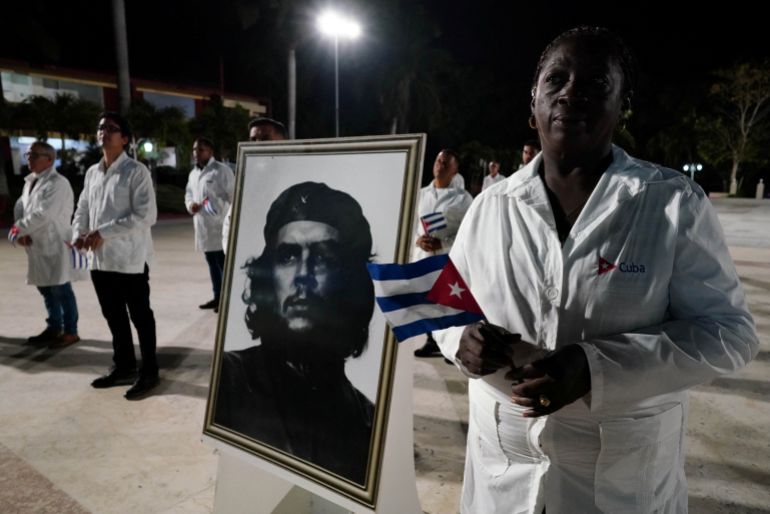The United States has announced it is revoking the visas of Brazilian, African and Caribbean officials over their ties to Cuba’s programme that sends doctors abroad, which Washington has described as “forced labour”.
The US named two Brazilian Ministry of Health officials, Mozart Julio Tabosa Sales and Alberto Kleiman, who have had their visas revoked for working on Brazil’s Mais Medicos, or “More Doctors” programme, which was created in 2013.
In a statement on Wednesday, US Secretary of State Marco Rubio said sanctions were imposed on officials “involved in abetting the Cuban regime’s coercive labour export scheme”, which he claimed “enriches the corrupt Cuban regime and deprives the Cuban people of essential medical care”.
“The Department of State took steps to revoke visas and impose visa restrictions on several Brazilian government officials, former Pan American Health Organization (PAHO) officials, and their family members for their complicity with the Cuban regime’s labour export scheme in the Mais Medicos programme,” Rubio said.
In an earlier statement, Rubio also announced visa restrictions for African officials, without specifying the countries involved, as well as the Caribbean country Grenada, for the same reasons.
The Cuban government has called Washington’s efforts to stop its medical missions a cynical excuse to go after its foreign currency earnings.
Cuba’s deputy director of US affairs, Johana Tablada, said its “medical cooperation will continue”.
“[Rubio’s] priorities speak volumes: financing Israel genocide on Palestine, torturing Cuba, going after health care services for those who need them most,” Tablada wrote on X.
Cuba’s international missions are sold to third countries and serve as a main source of foreign currency for the economically isolated nation, which has been subject to decades-long crippling sanctions by the US.
Havana’s international medical outreach goes back to the years following the 1959 Cuban Revolution, as Fidel Castro’s communist government provided a free or low-cost medical programme to developing nations as an act of international solidarity.
It is estimated that Havana has sent between 135,000 and 400,000 Cuban doctors abroad in total over the past five decades.
Brazilian Minister of Health Alexandre Padilha said his government would not bow to what he called “unreasonable attacks” on Mais Medicos.
Cuba’s contract in the programme was terminated in 2018 after then-President-elect Jair Bolsonaro questioned the terms of the agreement and Cuban doctors’ qualifications.
Washington is already engaged in a heated diplomatic row with President Luiz Inacio Lula da Silva’s government after imposing sanctions on Brazilian officials involved in Bolsonaro’s ongoing trial over his alleged coup plot in 2022.
Cuba’s healthcare system is public and meant to be universally accessible. But decades of sanctions and a downturn in tourism due to Trump’s travel ban mean the one-party state is no longer medically self-sufficient.
Since returning to the White House, the Trump administration has resumed its “maximum pressure” campaign against Cuba that typified his first term.
Last year, the island nation of 9.7 million people could not afford the $300m needed to import raw materials to produce hundreds of critical medicines.
In July, Trump imposed sanctions against Cuban President Miguel Diaz-Canel, Minister of the Revolutionary Armed Forces Alvaro Lopez Miera, and Minister of the Interior Lazaro Alberto Alvarez Casas for their “role in the Cuban regime’s brutality toward the Cuban people”.
Earlier, the Trump administration also signalled its intention to tighten visa restrictions on Cuban and foreign officials linked to Havana’s medical missions around the globe.
Rubio described the medical programme as one where “medical professionals are ‘rented’ by other countries at high prices”, but “most of the revenue is kept by the Cuban authorities”.
In 1999, after Hugo Chavez’s Bolivarian revolution in Venezuela, Cuba sent medical staff and educators to the country. In return, Cuba bought Venezuelan oil at below-market prices, developing the idea of Havana exporting medical professionals as a source of revenue.
Some 30,000 Cuban medical workers were sent to Venezuela in the first 10 years of the “Oil for Doctors” programme.
Cuba later received hard currency to set up permanent medical missions in countries including South Africa, Brazil, Ecuador and Qatar.
Source: Aljazeera

Leave a Reply